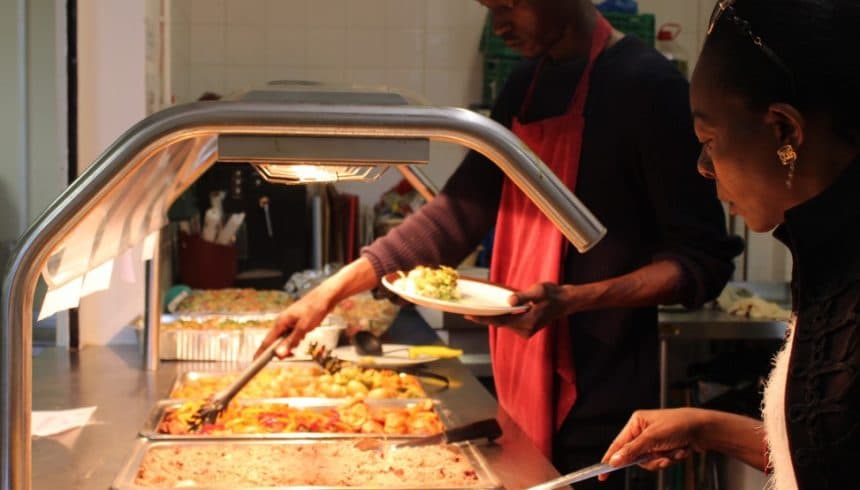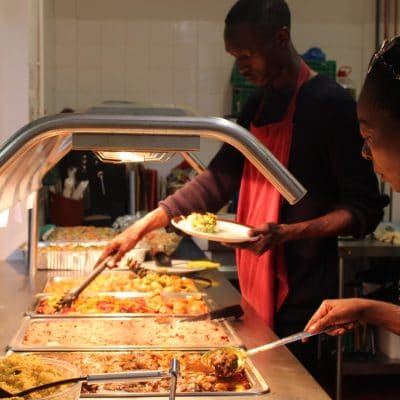In light of our recent report ‘For our welfare and not for our harm’, written in collaboration with Dr Anna Rowlands, Rhiannon reflects on our Day Centre’s Special Meal that celebrated Refugee Week, and how it truly showed the reciprocal nature of accompaniment.
The report revealed how, at JRS, our refugee friends particularly value our emphasis on accompaniment – being with, and treated first as foremost as human beings. I started working for JRS UK in June, and the very notion of accompaniment was relatively new to me. The way in which it bridges the gap between those in power and the most vulnerable members of our community; breaking down the colonial, service provider-beneficiary relationship and instead, focusing on the everyday, is something that I have been truly inspired by.
I am studying a part-time masters in Humanitarian Action and Peacebuilding, and was recently investigating how unmediated experience with cultures of the individuals you serve is a key factor in building cultural competence and sensitivity. I began to reflect on what unmediated service really means, and JRS has helped me both understand and witness this, and the Special Meal offered a great example.
As a faith-based organisation ‘serving’ here means that, through listening and learning from refugees, we can re-affirm their dignity as people and empower them when so many decisions are taken out of their hands, and when the circumstances of their lives conspire only to devalue them. Yet, through walking with refugees and embarking on their journeys with them, I have had the chance to witness the restoration of humanity from within a larger de-humanising system.
‘For our welfare and not for our harm’ speaks of the impact that JRS has had upon refugees’ individual lives, and although Dr Rowlands highlights that we are a small counter-culture within the broader asylum system, the happiness and glimpses of justice that JRS assists in creating is something truly magical to see.
Download & Read For our welfare and not for our harm
Within the report, one interviewee said: “The way you are treated here is like the opposite of how you are treated everywhere else in the system. It’s basic things that make the difference: a warm welcome, they use your name, shake your hand, eat food with you, view you as a human. This kind of interaction is what provides emotional support for me.”
For me, the special meal really epitomised JRS’ mission – and bought to mind a quote by St Francis of Assisi: “For it is in giving that we receive.” The joy that I witnessed at the special meal reached out to everyone who attended, whether a member of staff, volunteer or a refugee friend. When looking back to the special meal and the dignity it afforded to everyone, I realised that the report was right, we are all in search for a good life, ‘a life of a common people who come through birth or necessity to share a particular space and time’. Yes, JRS does exist alongside the continuing reality of structural violence inherent in the British asylum system, but the hospitality shared at the special meal bore witness to a space and time of mutual understanding and kindness, that every person felt dignified from.
I asked one of our volunteer chefs to comment on his experience of the special meal, and he said that he was “happy for the food. The food was very good.” The happiness that derived from the food bought me back to a quote that I recently read in a book: ‘food is symbolic of love when words are inadequate.’ To me, this reflects on how food is a universal experience, and how the special meal, here at JRS UK’s centre in Wapping, bought people from all different pathways together to share a special moment in time. This is what accompaniment means and I am beginning to realise that to understand others, you simply have to stand with them.
Could you volunteer as an Assistant Chef? Find out how to get involved here.



